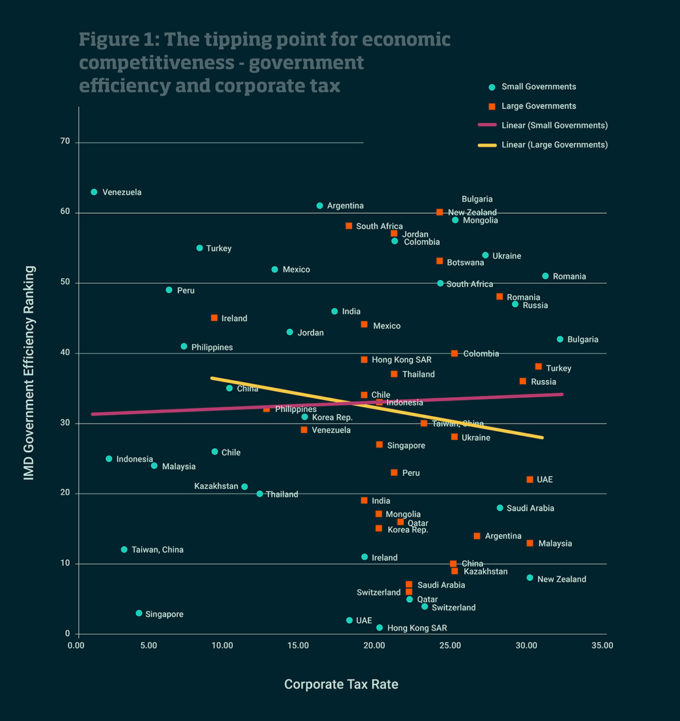
Digital sustainability: it pays to be a leader, not a laggard
Companies that excel in both digital and sustainable transformation attract a stock market premium, according to research. So, how do you tap into that value? ...

by Arturo Bris Published 18 August 2021 in Competitiveness • 5 min read
When, in July, the G20 economies agreed to set a minimum global tax rate of 15% for corporate income in the wake of the boom in tech corporations, these and other multinational giants were dealt a blow. No longer could they shift their profits to low-tax countries with ease – although not all countries in the G20 club have subscribed to the new way of doing international business, Ireland, Netherlands, Hungary and Luxembourg among them.
But what are the implications of higher corporate taxes on the competitiveness of economies, and not just on the balance sheets of such firms? The jury is out, owing to the complexity of the data.
Indeed, one of the puzzles we often encounter at the IMD World Competitiveness Center – where each year we compile a data-driven set of rankings on the competitiveness of economies – is how to explain why some countries with very low corporate taxes are highly competitive while others with similar tax rates fail to be so at all.

A host of economies with low corporate tax rates – among them Singapore (17%), Hong Kong (16.5%), Ireland (12.5%) and Qatar (10%) – fell into the top 20 in the Center’s flagship World Competitiveness Ranking in 2021. But a second set of countries, also with very low rates – Hungary (9%), Bulgaria (10%) and Croatia (18%), for example – occupied positions in the bottom 20 of the Ranking. They are not competitive nations in the way we interpret the word, that is: able to increase prosperity by drawing on their own advantages and assets.
But why is this? Corporate taxes are a double-edge sword. They contribute to the government budget, and therefore facilitate investments in infrastructure, health and education. Taxes are desirable to make a country competitive, representing a contribution made by the private sector to the long-term development of the country.
So when and why does the balance tip? Corporate taxes, by increasing firms’ cost basis, reduce their profitability and therefore their ability to expand, innovate and grow. Heavy taxation has an impact on the ability of companies to create jobs and, ultimately, on the competitiveness of nations. If a firm has to pay 40% of its corporate profits as tax, then it needs to reduce costs in some other way, possibly by reducing salaries, employment or product quality. How can a blanket, global rule on corporate taxation possibly take these differing paradigms into account?
Perhaps corporate taxes would be fairest if they were to fit into a range; not be too low nor too high. In reality, there is no significant correlation between competitiveness and corporate taxation. At least in principle. But there is one salient mediating variable in the effectiveness of taxes and their impact on corporations: the ability of governments to translate tax revenues into prosperity.

You might suppose that less efficient governments (Greece and Brazil, for instance), should not tax companies heavily because, in addition to the damage to firms’ bottom line, government spending financed by tax revenues will be mostly wasted. By this token, you might also imagine that very efficient public sectors (the UAE and New Zealand, for example) should not need to levy large taxes on corporations to guarantee a smooth functioning of their public services. But what are the indications for economies’ competitiveness, according to our research?
We classified countries by the size of their public sectors, measured by the ratio of total government expending to GDP. Countries with large governments include France and Brazil. Examples of small governments are Singapore and South Korea. We use this classification to assess the impact of corporate taxes on the efficiency of government (our so-called Government Efficiency criterion, defined as “the extent to which government policies are conducive to competitiveness”) as calculated in the 2020 IMD World Competitiveness Ranking.
Figure 1 summarizes our findings: for countries with small governments, the relationship between government efficiency and corporate taxes is positive (that is, the larger the corporate tax rate, the worse the competitiveness ranking). On the other hand, as countries with large governments reduce corporate taxes, they subsequently increase the competitiveness of their public sector and increase overall prosperity.
For countries with small public sectors, it is therefore desirable to reduce taxes, with a view to spurring on corporate development and investment. When institutions work and corporate values are adequate, a reduction in corporate taxes increases corporate investment in technology, for example, instead of increasing annual executive bonuses. When the country is efficient, cash windfalls from tax reductions find a value-creating use (like building a new plant or investing in executive development).
The opposite is true for bigger governments. When, because of corruption or inefficient regulation, the public sector wastes resources and diverts them for useless purposes or to fill private pockets, increasing corporate taxes makes these countries even more corrupt and their spending more wasteful. In turn, they become less efficient.
Countries that lie in the top half of government size would be well advised to downsize their public sectors by reducing the money they levy from the private sector, if they want to be more competitive.
And so it is that corporate taxes play a dual role in competitiveness: on the one hand, they increase government revenues and therefore public investment. On the other, they stifle the competitiveness of the public and private sectors. In countries where the state plays a reduced role in the economy (which usually implies lesser corruption, business-friendly institutions and healthy public finances), the former dominates; and in governments with large public sectors, the latter prevails.
The outcome of the G20 and OECD resolutions is yet to be defined but corporate innovation always moves faster than government regulation, meaning companies find ways to optimize their corporate tax bill. Until recently, this was achieved via corporate mobility. The difference now is that it is going to require a different set of tools.

Professor of Finance at IMD
Arturo Bris is Professor of Finance at IMD. Since January 2014, he has led the world-renowned IMD World Competitiveness Center. At IMD, Bris directs the Boards and Risks, Strategic Finance, and Navigating Fintech Innovation and Disruption programs. He also previously directed the flagship Advanced Strategic Management program between 2009 and 2013.

17 July 2024 • by Michael R. Wade, Evangelos Syrigos in Competitiveness
Companies that excel in both digital and sustainable transformation attract a stock market premium, according to research. So, how do you tap into that value? ...

8 July 2024 • by Richard Baldwin in Competitiveness
As the world’s largest democracy prepares to overtake China in terms of economic growth, it offers a huge investment opportunity, explains IMD’s Richard Baldwin....

26 June 2024 • by Arturo Bris in Competitiveness
Don’t be deterred by doom-laden narratives. To create societies that are prosperous and inclusive, it’s time for leaders to focus on facts and future readiness, says Arturo Bris...

14 June 2024 • by Howard H. Yu in Competitiveness
This weekend’s G7 summit will see renewed calls for protectionist measures against Chinese EV manufacturers. But tariffs would be misguided and universally damaging, warns IMD’s Howard Yu ...
Explore first person business intelligence from top minds curated for a global executive audience